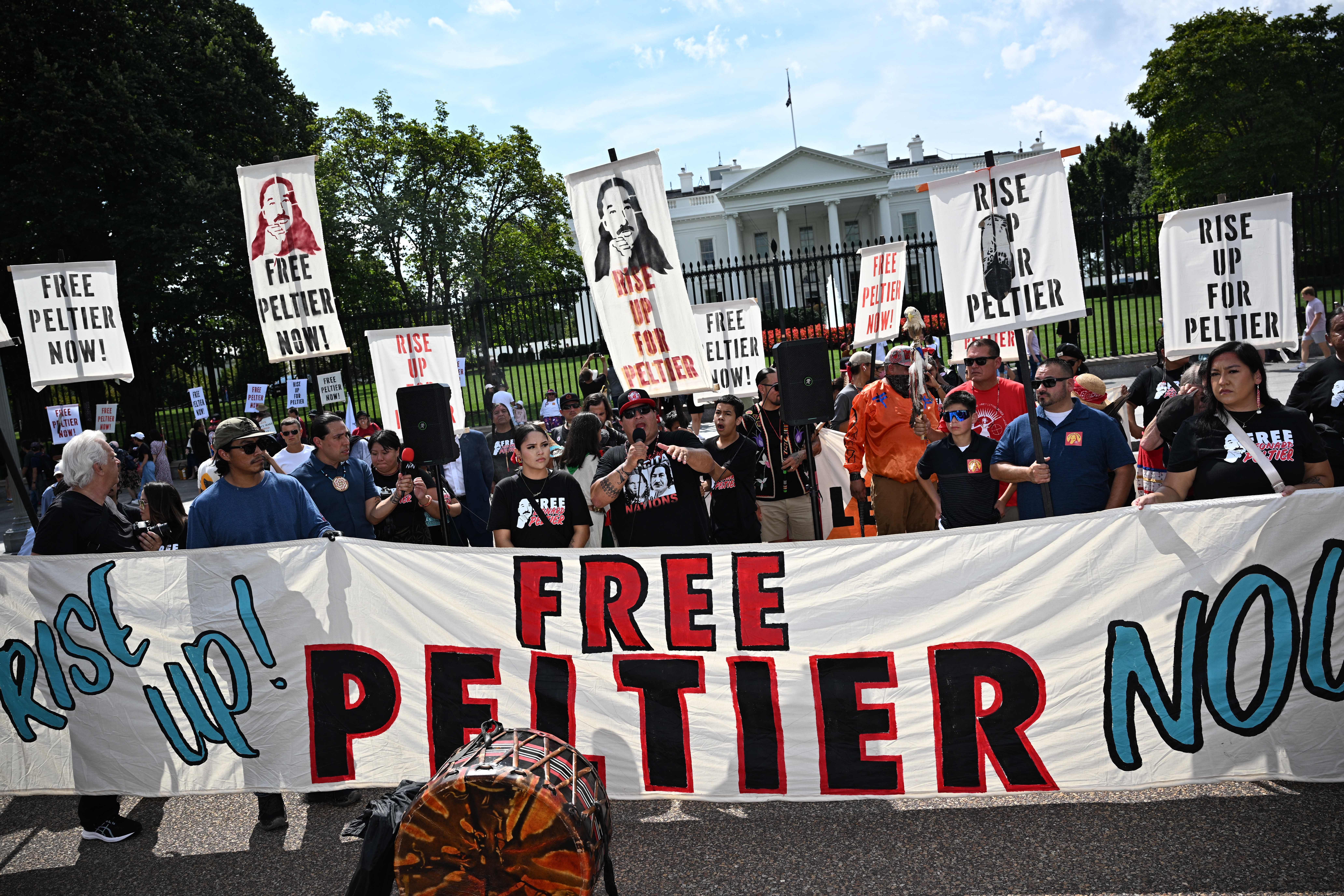Indigenous rights activists, including Native American elders representing various clans, tribes, and Indian nations, rallied in various locations throughout the country, on June 10, holding prayers and ceremonies for the compassionate release of 79-year-old Leonard Peltier.
Mr. Peltier, a member of the American Indian Movement (AIM), was convicted and sentenced to life in prison after an armed standoff with federal agents turned deadly on the Pine Ridge Indian Reservation in 1973.
According to his attorneys, documented prosecutorial misconduct, witness intimidation, and the tampering of evidence led to Mr. Peltier’s conviction, making him the longest-serving Native American political prisoner in the country.
Spending nearly 50 years of his life behind bars for the killing of two federal agents, Mr. Peltier is a member of the Turtle Mountain Chippewa tribe and has consistently maintained his innocence. Supporters hope that formerly suppressed evidence and his declining health condition will convince the parole board to let him go home.
“He was born in the height of what’s called The Termination Era, which is a time in history when the United States federal government was attempting to terminate the federal recognition of the sovereignty of Indigenous tribal nations, which to the extent that it happened, was disastrous,” said Attorney Moira Meltzer Cohen, a member of Mr. Peltier’s legal defense team, during a parole hearing update, webcast live over YouTube’s Black Power Media channel.
“There was just unchecked poverty, family separation, language lost, culture lost, the spiritual and traditional practices of Indigenous peoples were criminalized. We have a First Amendment to the Constitution that guarantees the free exercise of religion,” Atty. Meltzer Cohen explained.
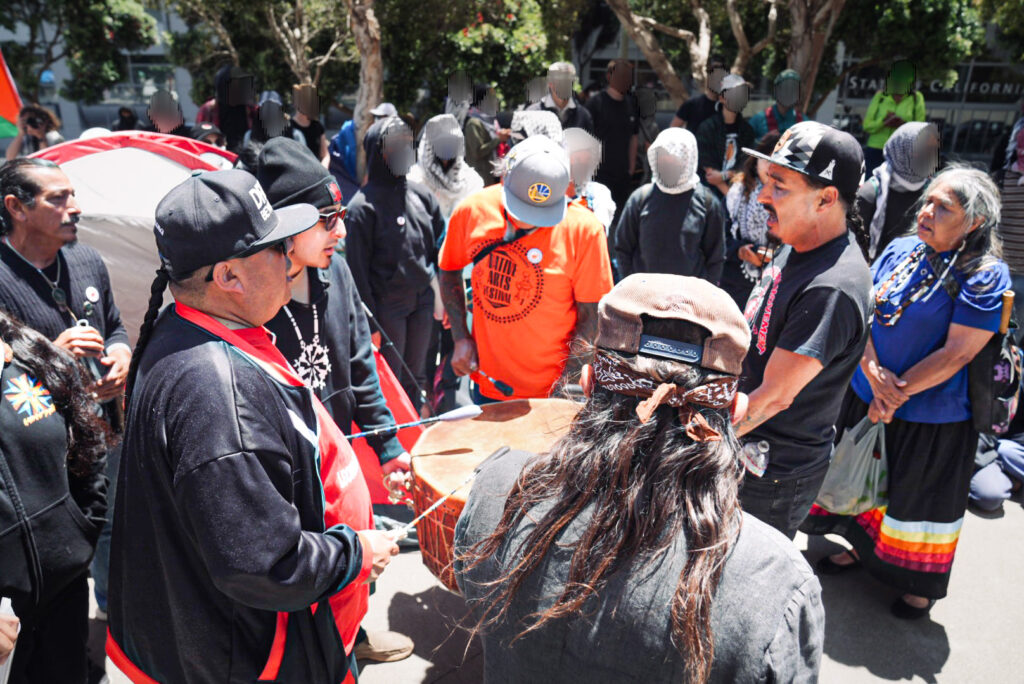
“But up until the late 70s, it was criminally illegal for Indigenous peoples to practice their ceremonial spirituality or their spiritual ceremonies,” she said of the time and circumstances surrounding Mr. Peltier’s birth and childhood as a Native American.
“People are starting to learn more now about the Indian boarding schools (see The Final Call Vol. 41 No.34), and Mr. Peltier is a survivor of the notoriously brutal Wahpeton boarding school and he was someone who as a young person, protested termination policies, fought for treaty rights, which are the supreme law of the land, fought for the rights of Indigenous people, and joined the American Indian Movement,” Atty. Meltzer Cohen added.
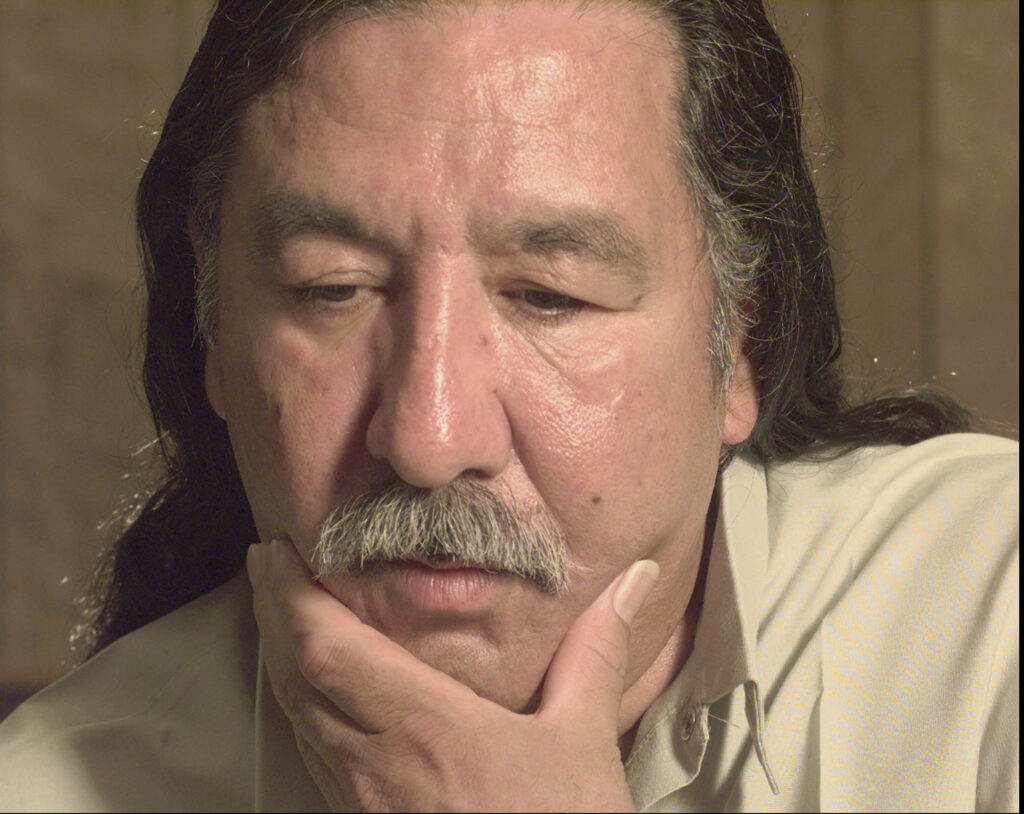
“It is not particularly controversial to observe that in the 1970s, civil rights groups like AIM, which engaged in community service, and constitutionally protected activity were subject to unlawful physical and electronic surveillance, propaganda and smear campaigns, infiltration and strategic and internal disruption, and politically motivated prosecution,” Mr. Peltier’s attorney said.
Noting these tactics were not only the allegations of activist groups but also revealed as documented facts uncovered by Congressional investigations, Atty.
Meltzer Cohen added that the tribal government of the Pine Ridge reservation in South Dakota was installed by the federal government and was used to dismantle the folkways, mores and customs of those “not sufficiently assimilationist,” and that those who resisted were often subject to harsh coercive measures.
“This is not something that is just folklore, this is documented in thousands of documents disclosed, pursuant to the Freedom of Information Act (FOIA), (and) the FBI’s own documents show that they were materially supporting extreme violence against traditionalist citizens of Pine Ridge, including arming (those) who worked for the tribal president, Dick Wilson, who were known as “the goon squad,’” Atty. Meltzer Cohen explained.
“The tribal president basically had his own private mercenary police force and arms, who was being armed by the FBI and they were involved in organized violence including murders, assassinations, sexual assaults, and firebombing,” Peltier’s lawyer said. “The FBI was not only supplying the goon squads with weapons and ammunition but turning a blind eye to the results and devastation.”
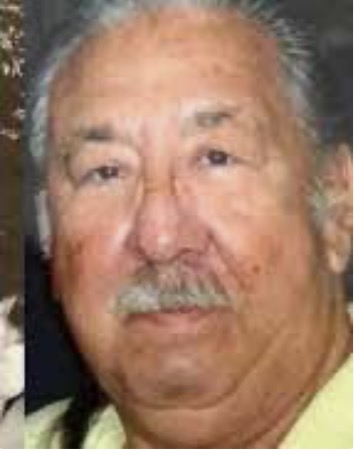
According to local historians and the Peltier legal team, this era of violence and oppression, known in Indian Country as “The Reign of Terror,” is what facilitated the 1973 AIM occupation of Wounded Knee, a hamlet and creek in southwestern South Dakota.
It was also the location of the notorious Wounded Knee massacre where hundreds of Lakota Sioux were gunned down by the United States Army in 1890.
Government misconduct exposed
Explaining that Mr. Peltier and three others were targeted for prosecution based upon what his legal team described as trumped-up charges and extreme official misconduct by those in authority, his attorneys postulate that although there was an exchange of gunfire and that two FBI agents were killed, the arrest, conviction, and subsequent sentencing of Mr. Peltier was based more upon political expediency than upon the merits of the case.
“Mr. Peltier fled to Canada because he knew he was not going to get a fair trial here in the United States and the investigation, the extradition, and his prosecution were all plagued by incredible, shocking, and well-documented government misconduct,” Atty.
Meltzer Cohen contended. Charges were dismissed against one defendant and two others were acquitted on the grounds of self-defense.
According to Peltier’s legal team, official government documents acknowledged the misconduct which included:
• The dissemination of inflammatory and false information to the respective courthouse.

• Fabrication of eye-witness affidavits.
• The use of perjured affidavits to extradite petitioner.
• The use of perjured firearms evidence at his trial.
• Fabrication of ballistics evidence and suppression of proof thereof.
• Fabrication of vehicle evidence and suppression of proof thereof.
• Fabrication of evidence that the petitioner killed the agents and suppression of eye-witness accounts that others were responsible.
• Fabrication of testimony of purported confessions by the petitioner and his codefendants.
• The coercion of children into giving perjured testimony.
• The manipulation of the judge and jury through the climate of fear in the courtroom.
• The government’s plot to kill the petitioner during an escape.
Languishing behind the walls of various federal prisons for nearly five decades, an ailing and infirmed Leonard Peltier continues to suffer from deteriorating health conditions as private associations affiliated with law enforcement organizations continue to lobby the courts and brand Mr. Peltier as a remorseless killer.
“The decades have been characterized by cruelty and neglect and fundamental unfairness,” said Atty. Jenipher Jones, lead counsel of Mr. Peltier’s legal team. Atty. Jones described Mr. Peltier as one dedicated to the principles of his culture and people.
Remaining a cultural icon to many Native Americans, a living martyr to the cause of Indigenous rights, and a humanitarian through his art, supporters said Mr. Peltier encourages Indigenous youth to embrace the knowledge of self as a means for healing, and by dedicating his life to promoting his people’s tribal traditions, cultural identity, and religious practices as a virtue.
“In this near 50 years that Leonard has been incarcerated, the state has dealt with him in a horrific manner,” Atty. Jones said.
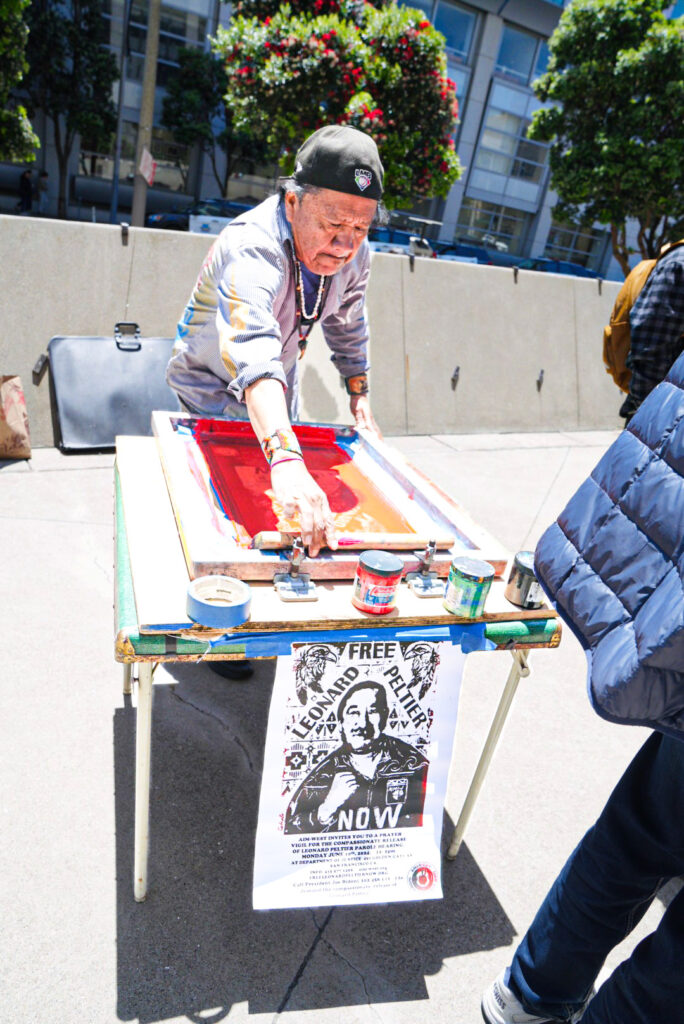
“He has spent a total of 15 years in solitary confinement, the entire time of his incarceration is marked by medical neglect, which has really come to the fore now that he is (nearly) 80, and pretextual disciplinary actions attempt to silence his voice, in terms of access to the media, that is ongoing to this moment,” she insisted.
Dawn Lawson, personal assistant to Mr. Peltier outside the walls of the United States Penitentiary, Coleman 1 in central Florida, and assistant to his legal team’s lead counsel, told The Final Call that over the decades of his incarceration, Mr. Peltier’s prosecutorial supervisor has come forward and said that they could not prove he committed any crime on that reservation and that a former FBI agent has even come forward to say that no one looked at the role that corrupt authorities played into what the Peltier legal team described as gross injustices.
“The people of Pine Ridge endured three years of being brutalized by their own tribal council who called themselves “the goon squad” and over 60 people were murdered,” Ms. Lawson said of the horrors on the Pine Ridge reservation hidden from public view in the late 1960s and early 1970s.
“The goon squad reported that the FBI had been providing them cash, intelligence, and weapons to kill people. Everything from the beginning has been a constitutional violation,” she said.
“There was a 17-page United Nations report outlining all the illegalities and constitutional violations and the U.S. has not responded; we do not even admit we have political prisoners,” Ms. Lawson insisted.
“Now, at 80 years old, he has an aortic aneurysm; he’s got diabetes; he has degenerative bone disease; he is experiencing the onset of intermittent blindness; he is in excruciating pain; he’s on a walker, and he keeps falling,” she said of the medical neglect continuing to ill-affect him within the prison.
“They gave him a CPAP machine so he can breathe during the night because of sleep apnea, but there’s no electrical outlet to plug it into. They’ve been withholding his medication, sometimes even the insulin, and they took his Tylenol away; he has nothing for pain,” Ms. Lawson continued.
A new generation rises
George Galvis is cofounder and executive director of Communities United for Restorative Youth Justice based in Oakland, California, and a member of the Quechua Nation, an Indigenous people from the Andean region of South America.
He told The Final Call that the plight of Leonard Peltier is felt beyond the borders of the United States and that since he was a teenager, he was mentored by veterans of the American Indian Movement.
“My elders told me that you don’t really know where you’re going unless you know where you’ve been, and for us, culture is our strength, culture is our healing, and culture is our recovery from over this 500 plus years of colonialism, and one form of genocide is ‘culturicide,’” Mr. Galvis said.
“By stripping away our culture and the things that have kept us healthy and strong since time immemorial, stripping us of our identity through violence, assimilation, synthesization, and hegemony, is a way of us becoming lost so we don’t continue to resist as Indigenous people rooted to the land.”
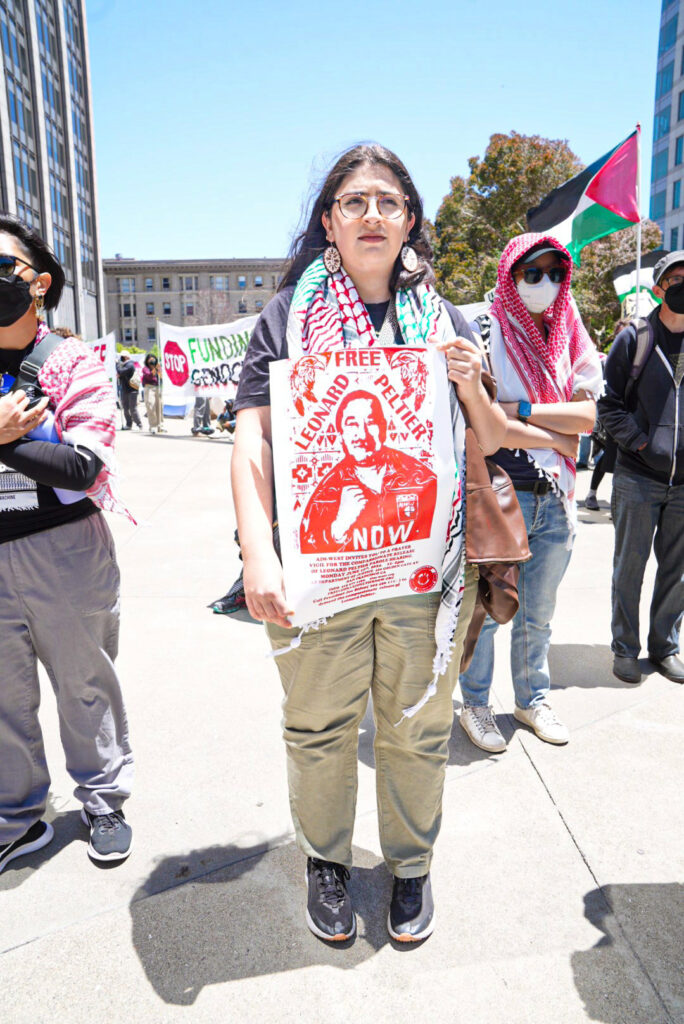
Mr. Galvis and many other Indigenous activists participated in prayers and spiritual ceremonies on what they identify as sacred land originally belonging to the Ramaytush Ohlone, the original inhabitants of the San Francisco Peninsula where the federal courthouse now stands.
Co-organizers of the “Stop the Genocide: Federal Court Appeal” rally and art, build to support plaintiffs in their historic case to charge the U.S. government with complicity in genocide, coincided with the June 10 parole hearing date of Leonard Peltier in Florida, bringing together Native Americans, Palestinian Americans, and other people of goodwill demanding justice and accountability for the oppressed.
Morning Star Gali, the founder and executive director of Indigenous Justice, out of Sacramento, California, shared with The Final Call that she was born during a sunrise ceremony in Oakland’s AIM House in 1979 and that she has been aware of Mr. Peltier’s case her entire life. She said the name given to her at birth was very intentional and that both of her parents were members of AIM.
“I had been born in the ceremony, my family members brought me out, introduced me to the sacred fire within minutes of being born, introduced me to our sacred ceremony, made those prayers and held me in that light of the morning star, and I received my name in that way,” Ms. Gali said.
“I continue to pass on those traditions, all four of my children have names within our traditional language, they all have tribal names, and it’s really a continuation of that prayer, a continuation of the efforts and sacrifices that have been made by our ancestors for us to be here and for our survival today,” Morning Star Gali said.
“I’ve always aligned both my personal and community values and support with freedom for Leonard Peltier. We are working to do everything we can do understanding the ongoing health challenges he’s experiencing in the push for a compassionate release and freedom for all political prisoners.”
The decision on Mr. Peltier’s parole is expected within 21 days of his June 10 hearing.
The Final Call Newspaper thanks Native American elders Lenny Foster, Fred Short, and Wounded Knee whose suggestions and input made coverage of this story possible.










